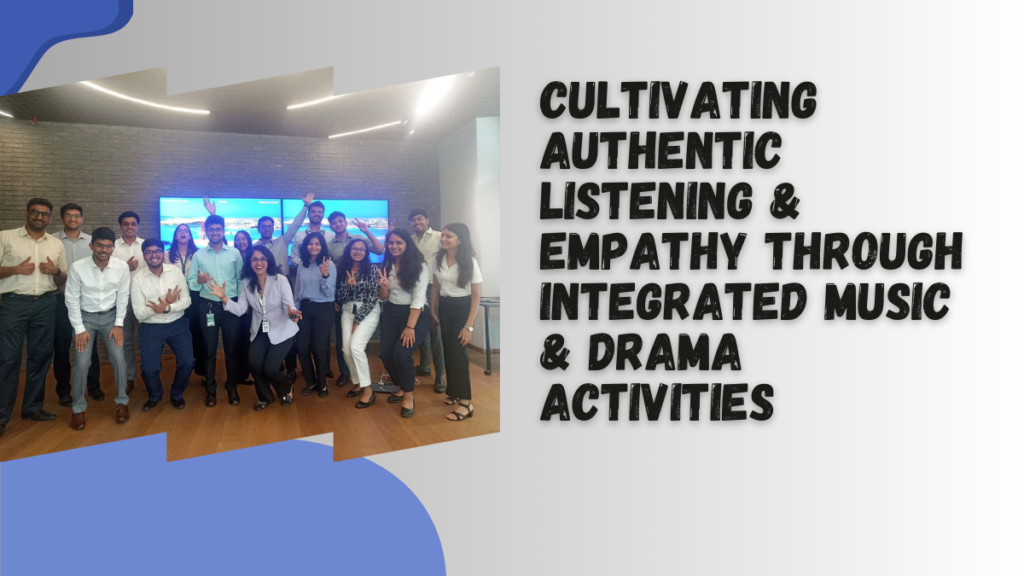Cultivating Authentic Listening & Empathy through Integrated Music & Drama Activities
Introduction
In today’s fast-paced world, the ability to listen deeply and respond with empathy is more important than ever. These essential skills not only enhance personal relationships but also play a critical role in professional success and societal well-being. One of the most effective and engaging ways to cultivate authentic listening and empathy is through integrated music and drama activities. These creative arts offer unique opportunities to connect with emotions, express feelings, and understand the perspectives of others.
In this article, we will explore how integrating music and drama can foster authentic listening and empathy, along with practical examples of activities you can incorporate into personal development or educational settings.
The Power of Music & Drama in Cultivating Empathy
Music and drama are expressive art forms that have long been recognized for their emotional resonance. They serve as powerful tools for communication and emotional expression, making them ideal for developing empathy—the ability to understand and share the feelings of others.
How Music Develops Empathy
Music transcends words, allowing individuals to express and feel emotions that might be difficult to verbalize. Through listening to music, participants can experience the emotional journeys of others, whether through a poignant melody, a powerful rhythm, or the dynamics of musical storytelling. Creating or performing music in a group setting further fosters empathy by requiring participants to listen actively to others and respond accordingly, building deeper emotional connections.
How Drama Develops Empathy
Drama, on the other hand, puts individuals in the shoes of another person, literally and figuratively. Role-playing, improvisation, and character exploration allow participants to experience life from different perspectives, encouraging them to understand diverse viewpoints and emotional experiences. This process naturally cultivates empathy, as individuals must listen attentively to their fellow actors and respond authentically within a given scenario.
Integrated Activities to Foster Authentic Listening and Empathy
Below are some integrated music and drama activities designed to cultivate authentic listening and empathy. These activities can be used in schools, corporate workshops, therapy settings, or even for personal growth.
1. Musical Conversations
In this activity, pairs or small groups take turns expressing emotions through musical improvisation using simple instruments (or even their voices). The goal is for participants to listen carefully to the emotions expressed in the music and respond with a musical “reply.” This activity builds both empathy and listening skills, as participants must tune into the emotional tone and tempo of the other’s musical expression.
2. Emotion through Role-Play and Soundtracks
In this activity, participants role-play scenarios that involve a range of emotions, such as joy, anger, or sadness, while a carefully selected piece of music plays in the background. The music can enhance the emotional tone of the scene, encouraging deeper engagement and helping participants connect more empathetically to the emotions being portrayed. This integration of sound and action promotes empathy by allowing participants to experience the emotional impact of both verbal and non-verbal communication.
3. Drama-Based Empathy Circles
In an empathy circle, participants sit in a group and take turns sharing a personal experience or emotion, while others listen without interruption. To integrate drama, one person acts as a “role-player” and reenacts the speaker’s story using drama techniques, such as movement, facial expression, and tone. The rest of the group reflects on the emotional experience, fostering a deeper understanding and empathetic response. Adding music to this exercise can heighten the emotional experience for both the speaker and the listeners.
4. Storytelling with Musical Interpretation
Participants are invited to tell a personal or fictional story while the rest of the group interprets the narrative through musical accompaniment. The goal is for the musicians to listen closely to the storyteller’s emotions and enhance them through the music they create. This activity teaches participants to listen not just for content, but for emotional nuance, encouraging a deeper empathetic connection.
Benefits of Integrated Music & Drama for Developing Listening and Empathy
Engaging in these creative activities offers numerous benefits:
- Enhanced Emotional Intelligence: Participants become more attuned to the emotions of others, enhancing their ability to respond empathetically.
- Improved Listening Skills: Activities that require listening for emotional cues help individuals become more mindful and attentive listeners.
- Team Building: Group music and drama activities foster collaboration and mutual respect, key components of empathetic relationships.
- Stress Reduction: Both music and drama are known to reduce stress and anxiety, creating a more open and compassionate mindset.
- Holistic Development: Integrating arts into emotional learning provides a well-rounded approach to personal and social development.
FAQ: Cultivating Listening & Empathy through Music and Drama
Music and drama allow individuals to connect deeply with their emotions and the emotions of others. Music expresses what words often cannot, and drama places individuals in different emotional contexts, promoting empathy by encouraging the understanding of others’ experiences.
Yes, music and drama activities are excellent tools for team building and improving communication skills in corporate environments. They encourage collaboration, active listening, and empathy among team members, enhancing workplace dynamics.
Absolutely. Integrated music and drama activities can be highly beneficial for children, helping them develop emotional intelligence, communication skills, and empathy from a young age.
No, these activities are designed to be inclusive and accessible to all participants, regardless of their prior experience. The focus is on emotional expression and connection rather than technical skill.
Regular participation is key. Incorporating music and drama activities into weekly or monthly routines can lead to more sustained development of empathy and listening skills over time.
Summary
Integrated music and drama activities offer powerful, creative pathways to cultivating authentic listening and empathy. Whether in educational settings, therapy, or corporate environments, these art forms can significantly enhance emotional intelligence, collaboration, and overall interpersonal relationships. By engaging in these activities, individuals can become more compassionate and attentive listeners, ultimately fostering a more empathetic world.
